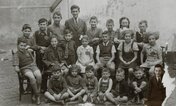weekly column
|
Each week, find a commentary on something connected to verses of Torah or another source of wisdom
|
|
Each week, find a commentary on something connected to verses of Torah or another source of wisdom
|
 The Last of Deuteronomy Always remember that you were a slave in the land of Egypt; therefore do I enjoin you to observe this commandment. Deuteronomy 24:22 There are at least two schools of thought about Holocaust education. One seeks to honor the memory of those who perished at the hands of the Nazis. The other seeks to honor the memory of those who lived before the Nazis. I hope it is obvious that I am describing the same group of people. The Jewish population of pre-World War II Europe was a flourishing and diverse world. More than just small towns that inspired “Fiddler on the Roof,” more than just Freud and Herzl and Karl Marx, more than manufacturing entrepreneurs and professional scholars, the world of Jews from Ukraine to Greece was as variegated as that of Europe as a whole. When we think about what we lost, we must think of all the things we were. The Jewish population of the concentration camps was stripped of its diversity to be dressed in striped uniforms and shaved heads. If you have watched films or seen still photographs of the enslaved laborers and those lined up for extermination, it is nearly impossible to distinguish between the sophisticated and acculturated secular Jew of Budapest and the poor and pious Jew of Horochov. Each victim stands for all the victims; all the victims are every victim. The experience of slavery in Egypt was defining for the generation of the Exodus. The life of servitude constituted the conversation between the liberated Israelites and their children who were born to a free if nomadic life. What do you think was the nature of Exodus education? This question is not about only the traumas visited on Jews at either end of 3000 years of history (and in between, and since). Every oppressed people has a choice to make about memory; every traumatized person has a choice to make about memory. What should be preserved in memory and what should be allowed to fade? The sprawling historical mini-series trend on television in the 1970s explored this question in dramatic (and sometimes very commercial) fashion. Perhaps no example is more pronounced than “Roots,” the broadcast version of Alex Haley’s telling of his family history beginning with a Gambian man, Kunta Kinte, kidnapped and sold to slavers at about the same time as the United States was born. Haley’s book was remarkable, but the visual expression of the very last episode lifted the question at hand to an unforgettable moment. Completing a visit to Gambia, Haley (played by James Earl Jones) is startled by a local (played by Levar Burton) who comes running up yelling “Mr. Kinte! Mr. Kinte!” Burton played Kunta as a young man, and now appeared before his very distant cousin as the embodiment of all that was maintained and all that was lost. Remembering is an intentional act. (I will have more to say about it soon.) It involves choices about what to include in the present-day consciousness and how to frame past experience – personal or collective – in calling it to mind. It is, of course, impossible to recall everything; our brains don’t have room and our lives don’t have time. So our choices carry with them decisions about relative importance and the values they represent. Those choices have consequences not merely about the past. They also have impact on the future. I grew up remembering the destruction of six million victims of murder. Black and white photos of frightened and emaciated men, women, and children. Piles of corpses next to smiling Nazis. 93 innocent girls choosing suicide over sexual abuse (a suspect story, by the way). As an adult, I visited Poland’s camps – Majdanek, Treblinka and, of course, Auschwitz – and the grim detritus of the Warsaw ghetto, with the small monument at Mila 18. My remembering was not a personal choice as much as a collective one. I grew into a Jewish community insistent on its sense of anger and offense. Famously, the late historian Emil Fackenheim added a 614th commandment to the traditional roster: do not give Hitler a posthumous victory. Less emphasized (though not ignored) was the bounty of that Eastern European Jewish tradition. Its scholarship, music, art and literature continued the rich legacies of the previous centuries. The Yiddish language, bountiful in its expressiveness and sensibilities, dwindled in my generation as a secret language among parents and grandparents, but persisted like the mint that grew perennially in our garden of annuals. As a kid, and even to large extent as a student, this culture was unconnected to the losses of the Holocaust, but no less resident in my Jewish sensibilities. “Remember,” commands the verse from Deuteronomy, connecting memory to enslavement. Reminded to remember, we cannot help but think through that mandate. But beyond the choice to remember is the equally important choice of what to remember.
0 Comments
Leave a Reply. |
Archives
October 2023
Categories |